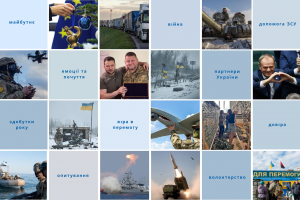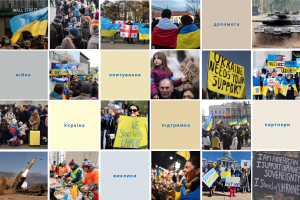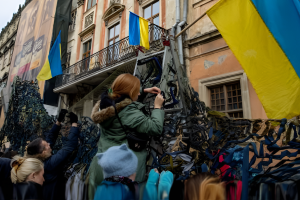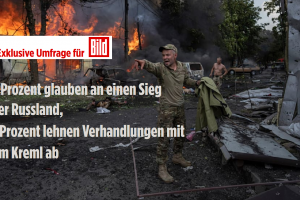Nationwide research was conducted by the Ilko Kucheriv Democratic Initiatives Foundation jointly with the Sociological Service of the Razumkov Center in the period of December 15-19, 2017 in all regions of Ukraine with the exception of Crimea and that occupied territories of the Donetsk and Luhansk oblasts. A total of 2,004 respondents older than 18 was polled. The theoretical margin of error does not exceed 2.3%.
Financing of the polling was realized within the framework of the MATRA project of the Embassy of the Kingdom of the Netherlands.
For comparison, the results of nationwide polling conducted by the Ilko Kucheriv Democratic Initiatives Foundation in cooperation with the Razumkov Center from December 16-20, 2016 and May 11-16, 2017 are provided below.
- Only 18% of the people support the idea of establishing peace in the Donbas by military means. At the same time, only 18% of the polled are in favor of peace “at all costs”. The majority of the population – 49% – feels that “for the sake of peace, it is worth agreeing to a compromise, but not all.
- The readiness for compromises declines with the rise in the remoteness from military actions. As such, 30.5% of residents of the South, 23% of the East, 25.5% of the Donbas and only 8% of Western Ukraine expressed their readiness for any compromises for the sake of peace.
- The acceptability or non-acceptability for citizens of Ukraine of certain compromises being proposed by for the sake of establishing peace in the Donbas is a very critical issue. Basically, the majority of the population of Ukraine did not support any of these compromises. The proposals to hold local elections on the condition that the militants in the Donbas are demanding are the most unacceptable (63% feel that such a compromise is unacceptable and only 12% feel that they are acceptable) and full amnesty of all participants of military actions against Ukrainian military forces (58% consider this unacceptable and 16% agree to such a compromise). Consent to particular political and economic relations of the temporarily uncontrolled territories with Russia do not have support of the people: 49% – against, 20% – in favor. Such variants of agreement as the formation of the local police, the courts and the prosecutor’s offices in the Separate Regions of the Donetsk and Luhansk Oblasts (SRDLO) exclusively with local representatives (55% and 17%, respectively), amendments to the Constitution regarding granting Russian the status of an official state language (56% and 24%), granting and securing in the Constitution the “special status” of separate territories of the Donetsk and Luhansk oblasts (49% and 28%), as well as adoption of the law on the neutral and out-of-bloc statues of Ukraine (41% call a compromise unacceptable, but 33% would agree with this).
- In the regional cross-section, the granting of “special status” to the occupied territories and fixing this fact in the Constitution seems to be the most unacceptable for residents of the Center (59%) and the West (55%) and in the Donbas the gap between those who would agree to such a compromise and those for whom it is not permissible is minimal: 39% and 41%, respectively, while for residents of the East this proposal is totally acceptable (44% – in favor, 32% – against). Prospect of a “special status” for separate territories of the Donetsk and Luhansk oblasts is particularly supported in the South (47% – in favor, 29% – against).
- Approval of the law on the neutral or out-of-bloc status of Ukraine as a compromise is unacceptable for the Western (56%) and Central (51%) regions, while in the controlled part of the Donbas, in the South and the East the opinion that such a compromise can be agreed to prevails. In the South 52% are “in favor”, while 16% are “against”, in the East – 54% and 24%, in the Donbas – 43% and 35%, respectively.
- Granting Russian language the status of the second official one is unacceptable for 68% of residents of the West, 57% – Center, and 48% controlled part of the Donbas. Meanwhile, in the South and the East the overwhelming majority feels that a compromise is expedient: in the South 54% - in favor and 20% are against, in the East 44% are in favor and 29% are against.
- Nobody in a single one of the regions of Ukraine agrees to full amnesty for all participants in the military hostilities against the Ukrainian military forces, though the number of proponents of such a compromise varies from 6% in the West to 28% in the Donbas and 29% in the South.
- The idea of holding elections on the occupied territory on conditions that self-proclaimed formations run for office is not supported in any of the regions of the country. The number of those who agreed to a compromise is the lowest in the West (5%), Center (9%) and the Donbas (12%) and is somewhat higher in the East (23%) and in the South (19%). Similarly, almost in all regions the majority of citizens do not agree with the formation of local police, courts and prosecutor’s offices in the self-proclaimed DPR and LPR exclusively of local representatives: in the West 10% of the people agree with this, in the Center – 12.5%, in the Donbas – 23%, in the East – 24%. Such a proposal is the most supported in the South, where 33% approve of it, and 37% do not approve.
- The attitudes of people in the regions towards the proposal to grant the right of special political and economic relations with Russia to the temporary uncontrolled territories of the Donbas were ambiguous. People in the Western (12% in favor, 56% against) and the Central (16% and 59%, respectively) regions and in the East (25% – in favor, 35% – against) were predominantly against. Meanwhile, in the other remaining regions the situation is ambiguous: positions in the South are divided (32% – in favor, 35% – against), while in the Donbas the support off this proposal is predominant: 38% – in favor, 32% – against.
- In the poll there were questions as to the possible influence of those or other international initiatives and decisions of the Ukrainian government as to the process of regulating the armed conflict in the Donbas: which of these initiatives will foster the process and which ones will be an obstacle to it? In the opinion of the people, the strengthening of sanctions of the EU and the U.S. against Russia will foster regulation of the conflict in the Donbas the most (“will foster it” – 55%, “will be an obstacle” – 26%); strengthening of armed forces and conducting special operations with gradual liberation of the occupied territories (“will foster it” – 55%, “will be an obstacle” – 26%); introduction of a provisional administration of the UN in support of peacekeeping forces for the management of the occupied territories for the period of withdrawal of Russian military troops and disarmament of militants (“will foster it” – 41%, “will be an obstacle” – 29%); renewal of social payouts for residents of occupied territories on general grounds (“will foster it” – 46%, “will be an obstacle – 23%), suspending the blockade of transport grids and trade with the occupied territories (“will foster it” – 55%, “will be an obstacle” – 26%). The support of such measures as Ukraine receiving lethal weapons from the U.S. somewhat prevails (“will foster it” – 44%, “will be an obstacle” – 36%), adoption of the law on amnesty for rank-and-file participants in illegal armed formations – citizens of Ukraine (“will foster it” – 37%, “will be an obstacle” – 29%). An expressly negative attitude towards granting the President full powers regarding the management of the Armed Forces, the National Guard and other military formations (19.5% support this, 39% do not support this and 41% are undecided as to their attitude).
- Public opinion on the attitude towards such decisions as Ukraine gaining a neutral status (refusal from accession to NATO) under joint obligations of the U.S., the EU and Russia is divided nearly in half (“will foster it” – 39%, “will be an obstacle” – 33%) as well as proclaiming the DPR and LPR terrorist organizations and their leaders as criminals and the suspension of any talks with them (“will foster it” – 33%, “will be an obstacle” – 35%). Moreover, the division of positions on these issues has a clearly expressed regional nature.
- In general, the attitude towards those or other decisions that can foster or obstruct the resolution of the conflict in the Donbas has clear regional differences The conviction that the introduction of a provisional administration of the UN with the support of peacekeeping forces in the process of regulating the conflict in the Donbas unites the regions (62% of the people in the Western region believe this, 49.5% – in the Center, 43% – in the South, 39% – in the East and 35.5% – in the Donbas). The certainty of the positive influence of renewal of social payouts on general grounds for residents of the occupied territories is also mutual. (60% in the Donbas, 61% in the East, 51% in the South and are convinced of this, while 30% in the West have the opposite view).Yet another mutual position in all regions is the negative attitude towards granting full powers the President in the management of Armed Forces, the National Guard and other military formations – 56% of the residents of the Donbas believe that such a decision will be an obstacle to the management of the conflict in the Donbas (only 7% disagree with this), 46% of the residents of the East (15.5% disagree), 37% of the residents of the Center (21% disagree), 37% of the residents of the West (21.5% disagree), while in the South the opinions are almost equally divided: 32% feel that granting the President full powers regarding the management of all military formations will be an obstacle to the process of peaceful regulation of the conflict in the Donbas, while 27% are of the opposite opinion that it will foster such regulation.
- The remaining possible initiatives or decisions regarding regulation of the conflict in the Donbas evoke different reactions in different regions of Ukraine. In the West, Center and South of Ukraine people consider that Ukraine receiving lethal defense weapons from the U.S. is a factor that will foster regulation of the conflict in the Donbas (in the West 61% of the people are sure of this), unsure – 20%, in the Center –47% and 36%, respectively, in the South – 43% and 34%). In the East (56%) and in the Donbas (43%) the overwhelming or relative majority of residents considers that this will obstruct the regulation of the conflict.
- Almost in all regions, including Donbas, respondents consider that strengthening of sanctions of the EU and the U.S. against Russia is a factor that will foster regulation of the situation in the Donbas. The only region where the majority of residents do not agree to this is the East of Ukraine, where people predominantly don’t believe that such strengthening will help regulate the situation (29% feel that this will foster regulation, while 43% – feel that it will be an obstacle).
- Suspension of the blockade of transport grids and trade with the occupied territories in the South, East and Donbas are considered a fact that will foster regulation of the conflict in the Donbas, while in the Western and Central regions these positions are divided almost in half: in the West 32.5% assess suspension of the blockade as a factor that will foster regulation of the conflict, while 36% – a factor that will obstruct this process and in the Central region – 36% an 32.5%, respectively.
- Adoption of the Law on Amnesty for Rank-and-file Participants of Illegal Armed Formations – Citizens of Ukraine almost in all regions is perceived as a factor that will foster the process of peaceful regulation of the conflict in the Donbas (in the Central region 39% of the people feel this way, 29% disagree, in the Southern region – 52% and 18%, respectively, in the Eastern region – 36% and 26%, in the Donbas – 40% and 33%). Meanwhile, in the Western region people are convinced of the opposite: 45% feel that such amnesty will obstruct the regulation of the conflict and only 18% – it will foster such regulation.
- The proposal of Ukraine gaining neutral status clearly divides the country into two parts: in the Western and Central regions people feel that this will obstruct the processes of the conflict management in the Donbas, while in the Eastern, Southern regions and in the Donbas – on the contrary, it will foster this process.
- Declaration of the DPR and LPR as terrorist organizations and their leaders – criminals and suspension of holding any talks with them are considered only in the Western region to be factors that will foster regulation of the conflict in the Donbas (44%, 26% disagree with this), the opinions of residents of the Central region are divided (in the opinion of 32%, such a decision will foster regulation. while 38% feel that it will be obstacle) and in the South (“will foster this process” – 29.5%, “will obstruct it” – 34%). In the East (41% versus 26%) and in the Donbas (45% versus 24%) are certain that such a decision will mostly obstruct peaceful regulation of the conflict in the Donbas.
- In the Western, Central and Southern regions of Ukraine people consider the strengthening of the armed forces and conducting special operations with the gradual liberation of the occupied territories a factor that will foster the regulation of the conflict in the Donbas (in the West – 61%, disagree – 14%, in the Center, 48% and 29%, respectively, in the South – 47% and 27.5%, respectively). In the East and the Donbas public opinion is divided: in the East 36% feel that such actions will obstruct the process of regulation in the Donbas, while 30% are certain that this will foster regulation, and in the controlled part of the Donbas 36% think this measure will contribute to the conflict management, while 35% have the opposite position.








